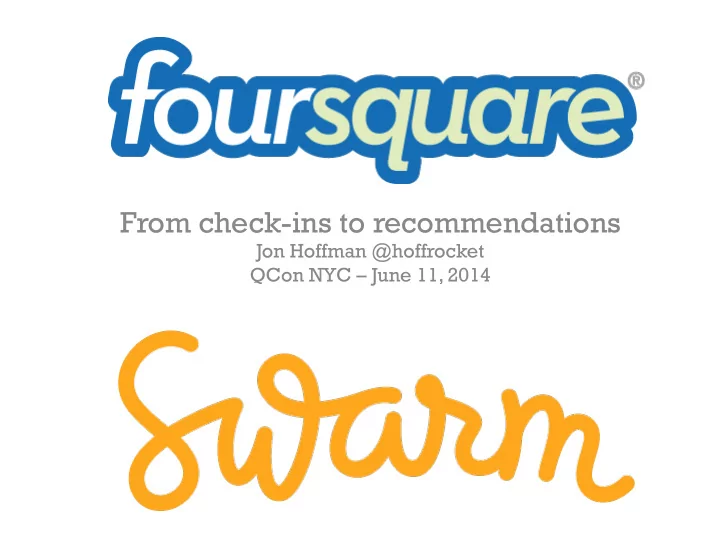

From check-ins to recommendations Jon Hoffman @hoffrocket QCon NYC – June 11, 2014
About Foursquare
Scaling in two parts • Part one: data storage • Part two: application complexity
Part 1: Data Storage 2009
Table splits DB.A Venues Checkins DB Venues Checkins Users DB.B Friends Users Friends
Replication Master RW Slave Slave RO RO
Outgrowing our hardware • Not enough RAM for indexes and working data set • 100 writes/second/disk
Sharding • Manage ourselves in application code on top of postgres? • Use something called Cassandra? • Use something called HBase? • Use something called Mongo?
Besides Mongo • Memcache • Elastic search – nearby venue search – user search • Custom data services – Read only key value server – in memory cache with business logic
HFile Service: Read only KV Store HFile Servers Hadoop hfile_0_a hfile_0_b hfile_0 Application hfile_1 Servers MR HDFS hfile_1_a hfile_1_b Zookeeper: - data type to machine mapping - key hash to shard mapping
Caching Services Oplog Tailer Mongo Kafka Kafka Consumers Cache Redis Servers getUserVenueCounts( 1: list<i64> userIds 2: list<ObjectId> venues) Application Servers
Part 2: application complexity 2009
RPC Tracing
Throttles
Remember the goats?
Monolithic problems • Compiling all the code, all the time • Deploying all the code all the time • Hard to isolate cause of performance regressions and resource leaks
SOA Infancy • Single codebase, Multiple builds API Web Offline
Finagle Era • Twitter’s scala based RPC library service ¡Geocoder ¡{ ¡ ¡ ¡GeocodeResponse ¡geocode( ¡ ¡ ¡ ¡1: ¡GeocodeRequest ¡r ¡ ¡ ¡) ¡ } ¡
Benefits • Independent compile targets • Fined grained control on releases and bug fixes • Functional isolation
Problems • Duplication in packaging and deployment efforts • Hard to trace execution problems • Hard to define/change where things live • Networks aren’t reliable
Builds and deploys • single service definition file • consistent build packaging • simple deployment of canary & fleet ./service_releaser ¡–j ¡service_name ¡ ¡
Monitoring • healthcheck endpoint over http • consistent metric names • dashboard for every service
Distributed Tracing
Exception Aggregation
Application Discovery • Finagle Server Sets + ZK
Circuit Breaking • Fast failing RPC calls after some error rate threshold • Loosely based on Netflix’s hystrix
SOA Problem Recap • Duplication in packaging and deployment efforts – Build and deploy automation • Hard to trace execution problems – Monitoring consistency – Distributed Tracing – Error aggregation • Hard to define/change where things live – Application discovery with zookeeper • Networks aren’t reliable – Circuit breaking
Organization • Smaller teams owning front to back implementation of features • Desire to have quick deploy cycles on new API endpoints
Remote Endpoints Wouldn’t it be cool if a developer could expose a new API endpoint without redeploying our still monolithic API server?
Remote Endpoint Benefits • Very easy to experiment with new endpoints • Tight contract for service interaction – JSON responses – all http params passed along • Clear path to breaking off more chunks from API monolith
Future work: Part 3? • Further isolating services with independent storage layers? • Completely automated continuous deployment • Hybrid immutable/mutable data storage – mongo & hfile & cache service
Thanks! • Want to build these things? https://foursquare.com/jobs • jon@foursquare.com
Recommend
More recommend